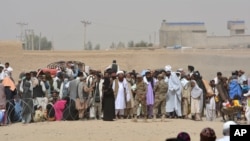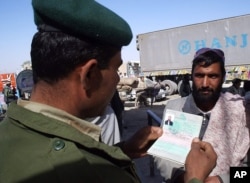Pakistan says it reopened a busy border crossing with Afghanistan for routine traffic after Kabul apologized over the burning of the Pakistani flag by angry Afghan protesters.
The southwestern Chaman crossing was closed two weeks ago after the anti-Pakistan rally on the Afghan side of the border turned violent and demonstrators attacked the entry gate, setting fire to the flag.
“We are all aware Afghanistan has already tendered an apology and the Chaman gate has been opened today,” Pakistani Army spokesman Lt.-General Asim Bajwa said Thursday in Rawalpindi.
The border closure stranded thousands of travelers and trade convoys, causing heavy financial losses to Afghan and Pakistani traders. Bajwa explained the delay in reopening the facility for traffic.
“It was a very sad incident and the reasons being given [by Afghan officials] were not, I think, sufficient enough to be accepted,” Bajwa said in Rawalpindi, where Pakistan's military is headquartered.
The general also said authorities have increased efforts to strengthen security along the Afghan border to prevent extremists linked to the Taliban and Islamic State terrorist group from entering the country.
He added that Pakistan is building gates at 18 crossings on what he referred to as the porous 2,600-kilometer-long frontier with Afghanistan. Immigration and other required staff also will be deployed there as part of Pakistan’s border management system, Bajwa said.
Afghan officials opposed Pakistani border construction plans because Kabul traditionally does not recognize the frontier as an international boundary.
The government in Kabul also alleges covert support Taliban insurgents receive from the Pakistani military spy agency has enabled them to prolong the war in Afghanistan.
Bajwa rejected as incorrect U.S. and Afghan assertions that Pakistan’s counterterrorism operations spare Afghan Taliban and militants linked to the Haqqani Network, which are accused of using Pakistani soil for staging deadly attacks in Afghanistan and India.
“There is no concept of good or bad Taliban,” General Bajwa reiterated while responding to U.S. Secretary of State John Kerry’s skepticism of Pakistan’s counterterrorism operations.
During his trip to neighboring India, Kerry said Islamabad has made progress in the fight against terrorism, but urged Pakistan to push harder against the Haqqanis and other militants.
But Bajwa said, “Terrorists of all terrorist organizations, including Haqqanis, including Afghan Taliban, have been killed and some apprehended and their disposal of course has been worked out with Afghan authorities, or with [NATO’s] Resolute Support mission [in Afghanistan]. So, if you say that actions have not been taken, or not being taken, [it] is wrong.”
He also said Pakistani forces have arrested more than 300 militants linked to the Syria-based Islamic State, including its senior leader to “forestall for the time being” the threat the group poses to the country.
He noted that presence of IS militants in border regions of Afghanistan is a cause of concern for his country. IS is active in at least two eastern Afghan provinces, namely Nangarhar and Kunar, and both are adjacent to the Pakistani border.
The border tensions and mutual allegations of supporting terrorist attacks on each other's soil are primarily responsible for the deterioration in bilateral ties between Afghanistan and Pakistan.





